
Twickenham Park was an estate in Twickenham in south-west London.

Twickenham Park was an estate in Twickenham in south-west London.
The New Park of Richmond, later called Twickenham Park, passed to Edward Bacon in 1574 and to the English philosopher, Francis Bacon, in 1593. [1] In 1608 the property passed to Lucy Russell, Countess of Bedford. [1] The courtier and poet Cecily Bulstrode died at Twickenham Park on 4 August 1609. [2] In 1618 the Countess Bedford gave it to a relative, Sir William Harrington, Member of Parliament for Hertford. Harrington sold it to Mary Home, Countess of Home, a cousin of Lady Bedford, in 1621. [1]
The property was acquired from the Countess of Home by Sir Thomas Nott, a Royalist Army officer, in 1640. [3] Nott remained there until 1659 when he sold it to a Mr Henry Murray. [1] In 1668 Murray sold it to John Berkeley, 1st Baron Berkeley of Stratton, another Royalist Army officer, who died in 1678. [4]
In 1685 the Berkeley family sold the property to Robert Brudenell, 2nd Earl of Cardigan. [1] The property was then bought by Sir Thomas Vernon, Member of Parliament for Whitchurch, in 1698 [5] and by Algernon Coote, 6th Earl of Mountrath in 1743. [1]
In 1766 the property passed to the Harriet Pelham-Holles, Duchess of Newcastle-upon-Tyne, who set about mixed farming in the park, [6] and in 1788 it passed to Lord Frederick Cavendish, a British Army officer. [7]
Following Cavendish's death in October 1803 the house passed to Sir William Abdy, 7th Baronet. [8] Abdy sold the house at auction to Francis Gosling who in turn demolished it in 1809. [8]
The Treasurer of the Household is a member of the Royal Household of the Sovereign of the United Kingdom. The position is usually held by one of the government deputy Chief Whips in the House of Commons. The current holder of the office is Mark Tami MP.

Earl of Hardwicke is a title in the Peerage of Great Britain. It was created in 1754 for Philip Yorke, 1st Baron Hardwicke, Lord High Chancellor of Great Britain from 1737 to 1756. He had already been created Baron Hardwicke, of Hardwicke in the County of Gloucestershire, in 1733, and was made Viscount Royston at the same time as he was given the earldom. These titles were also in the Peerage of Great Britain.
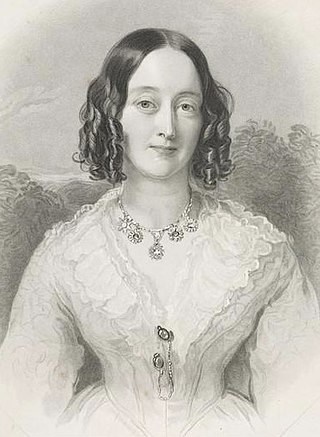
Charlotte Anne Montagu Douglas Scott, Duchess of Buccleuch and Queensberry, VA was a British peeress. A daughter of Thomas Thynne, 2nd Marquess of Bath, Charlotte married Walter Montagu Douglas Scott, 5th Duke of Buccleuch in 1829. They had seven children, including William Montagu Douglas Scott, 6th Duke of Buccleuch; Henry Douglas-Scott-Montagu, 1st Baron Montagu of Beaulieu; and the Royal Navy admiral Lord Charles Montagu Douglas Scott.

Henry Frederick Thynne, 3rd Marquess of Bath, styled Lord Henry Thynne until January 1837 and Viscount Weymouth between January and March 1837, was a British naval commander and politician.
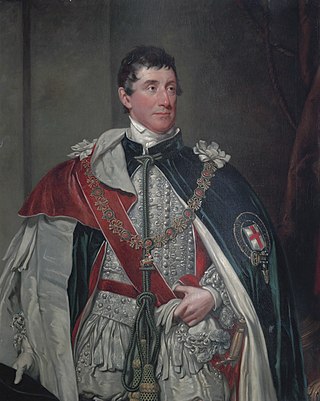
Thomas Thynne, 2nd Marquess of Bath KG, styled Viscount Weymouth from 1789 until 1796, was a British peer.

Sir Thomas Shirley, of Wiston in Sussex, was an English Member of Parliament, government official and courtier who is said to have suggested the creation of the title of baronet.
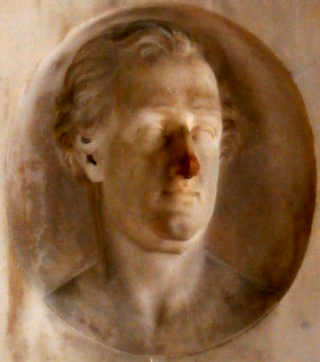
Henry Frederick Carteret, 1st Baron Carteret PC (1735–1826), of Haynes, Bedfordshire, was Member of Parliament for Staffordshire (1757–1761), for Weobley in Herefordshire (1761–1770) and was Master of the Household to King George III 1768–1771. He was hereditary Bailiff of Jersey 1776–1826.

Thomas Thynne, 2nd Viscount Weymouth of Longleat House in Wiltshire was an English peer, descended from Sir John Thynne (c.1515-1580) builder of Longleat.

Elizabeth de Berkeley, Countess of Warwick and Baroness Lisle, was an English noblewoman and heiress. She was the only child of Thomas de Berkeley, 5th Baron Berkeley, and Margaret de Lisle, 3rd Baroness Lisle.

Sir Alexander Carew was an English landowner, soldier and politician from Antony, Cornwall. Elected Member of Parliament for Cornwall in November 1640, he voted for the execution of the Earl of Strafford in May 1641, and supported the removal of bishops from the Church of England.

Justice of the Common Pleas was a puisne judicial position within the Court of Common Pleas of England and Wales, under the Chief Justice. The Common Pleas was the primary court of common law within England and Wales, dealing with "common" pleas. It was created out of the common law jurisdiction of the Exchequer of Pleas, with splits forming during the 1190s and the division becoming formal by the beginning of the 13th century. The court became a key part of the Westminster courts, along with the Exchequer of Pleas and the Court of King's Bench, but with the Writ of Quominus and the Statute of Westminster, both tried to extend their jurisdiction into the realm of common pleas. As a result, the courts jockeyed for power. In 1828 Henry Brougham, a Member of Parliament, complained in Parliament that as long as there were three courts unevenness was inevitable, saying that "It is not in the power of the courts, even if all were monopolies and other restrictions done away, to distribute business equally, as long as suitors are left free to choose their own tribunal", and that there would always be a favourite court, which would therefore attract the best lawyers and judges and entrench its position. The outcome was the Supreme Court of Judicature Act 1873, under which all the central courts were made part of a single Supreme Court of Judicature. Eventually the government created a High Court of Justice under Lord Coleridge by an Order in Council of 16 December 1880. At this point, the Common Pleas formally ceased to exist.
Sir James Thynne was an English landowner and politician who sat in the House of Commons in two periods between 1640 and 1670.
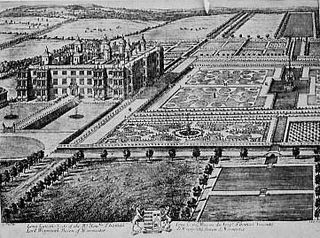
Sir Thomas Thynne (c.1578–1639), of Longleat, Wiltshire, was an English landowner and politician who sat in the House of Commons at various times between 1601 and 1629. His romance with the daughter of his family's enemies may have inspired Shakespeare to pen Romeo and Juliet.
Sir Thomas Thynne was an English lawyer and politician who sat in the House of Commons in 1660.
Charles Thynne was an English politician who sat in the House of Commons at various times between 1614 and 1629.
Dorothy Kitson, later Dorothy, Lady Pakington, was the daughter of Sir Thomas Kitson, a wealthy London merchant and the builder of Hengrave Hall in Suffolk. Her first husband was Sir Thomas Pakington, by whom she was the mother of Queen Elizabeth I's favourite, Sir John "Lusty" Pakington. After Sir Thomas Pakington's death, she married Thomas Tasburgh. She was one of the few women in Tudor England to nominate burgesses to Parliament and to make her last will while her husband, Thomas Tasburgh, was still living. Her three nieces are referred to in the poems of Edmund Spenser.
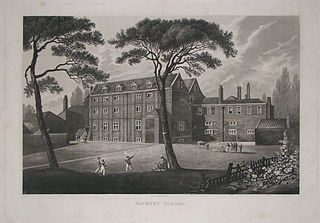
Newcome's School was a fashionable boys' school in Hackney, then to the east of London, founded in the early 18th century. A number of prominent Whig families sent their sons there. The school closed in 1815, and the buildings were gutted in 1820. In 1825 the London Orphan Asylum opened on the site. Today the Clapton Girls' Academy is located here.
William Thynne was an English courtier and editor of Geoffrey Chaucer's works.

George Simon Harcourt, 2nd Earl Harcourt, styled Viscount Nuneham until inheriting the title of Earl Harcourt in 1777, was an English politician, patron of the arts, and gardener.